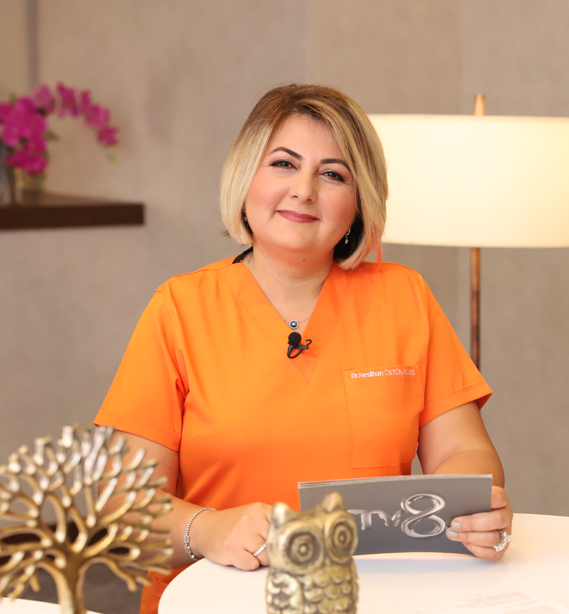Neural Therapy

What is Neural Therapy?
Neural therapy is also called neural therapy. It means applying a stimulating and regulating effect to the body's network for healing. The network covering the whole body is the autonomic nervous system, and it does not consist of nerves like wires. There is a system consisting of electrical potential of cells, intercellular fluid and nerves.
The autonomic nervous system is regulated by neural therapy. Negative stimuli in disruptive fields are neutralized. Bio-electrical damages in the autonomic nervous system are the basis of many diseases and persistent pain. Microbial diseases, accidents, surgeries, physical and psychological traumas and other factors can create bio-electrical problem areas.
When our tooth decays, when our tonsils become inflamed, when we have an operation such as a cesarean or dental treatment, the communication network of that region is affected. Bio- electrical damages that can be permanent for life may occur. Neural therapy can be applied to the skin of these areas, which are called disruptive areas, and thus communication disorders can be eliminated.
The main purpose of neural therapy, which can also be perceived as an injection therapy, is not to inject drugs with a needle. The most important therapeutic feature is that it gives the physician an interference field approach. In this way, it provides a great advantage in terms of finding the source of the disease.
How Do Neural Therapy Sessions Work?
Antalya neural therapy sessions are applied in 4-6 sessions depending on the patient's condition. Session intervals vary between 3 and 5 weeks. Our expert teams plan the treatment method individually. Since it is a restorative treatment, it does not show a rapid effect and its effects begin to be seen after 2-3 sessions. Within 1 year, the effects reach the highest level.
How is Neural Therapy Applied?
Antalya neural therapy is generally the treatment method preferred by helpless patients for whom pharmaceutical medicine cannot find a solution. When a new condition develops after the patient or a patient's relatives are introduced to neural therapy, treatment may be preferred as the first choice.
Neural therapy can be applied to pregnant and lactating mother and people with diabetics, blood pressure and heart disease etc. With the given diseases, it can be applied together with the treatment of drugs used in these diseases. In some applications, caution should be exercised in those who use blood thinners.
Neural therapy includes the words needle, nerve therapy, and injection. Needles are not applied to the nerve. The autonomic nervous system is ubiquitous. The aim of the treatment is to provide stimulation and injections are made for stimulation.
In Antalya neural therapy applications, small needles applied to the skin are usually sufficient. It can also be applied to all organs, all wounds in the body and surgical scars. The needles used in the application are not in the form of injecting drugs, but the purpose is to create a positive stimulation in the autonomic nervous system. Although there may be different deep needles in the whole neural therapy discipline, deep needles can generally be applied in more advanced patient groups.
It is a mistake to perceive neural therapy as a needle therapy. Applications can be applied very easily even for those with serious needle phobia. Needles are not applied to the nerve, but to the skin. The bio-electrical effect of the short-acting local anesthetic is utilized.
Which Diseases Is Neural Therapy Good For?
Neural therapy is used in the treatment of many different diseases. It is especially effective in long-term, persistent pain, where classical medicine is insufficient. It is effective in many diseases from hormonal disorders to some systemic diseases. It also has a protective effect for general health. In this respect, the main diseases that neural therapy applications are good for are:
- • Migraine
- • Tension type headache
- • Cluster headache
- • Trigeminal neuralgia
- • Fibromyalgia (soft tissue rheumatism)
- • Waist-neck-back pain
- • Hernias
- • Spinal calcifications
- • In all neuralgias such as shingles pain, neuropathic pain, nerve traumas
- • All headaches
- • Dizziness (vertigo)
- • Tinnitus (tinnitus)
- • Meniere's disease
- • Facial paralysis (peripheral facial paralysis)
- • Carpaltunel syndrome (wrist nerve compression)
- • Ulnar groove syndrome
- • In other neurological diseases
- • Hormonal disorders
- • Menstrual irregularities
- • Early menopause
- • Thyroid diseases
- • Surgical scars on the body
- • Frequent infections such as tonsillitis
- • Knee, tendinitis, shoulder pain, sports injuries
- • Fibromyalgia and other rheumatic diseases
- • Mental illnesses such as panic attacks and depression
- • Chronic constipation treatment
- • Treatment of intestinal diseases such as irritable colon syndrome, ulcerative colitis and crohn's
- • Facial paralysis treatment
- • Trigeminal neuralgia treatment
- • Sports injuries treatment
- • Purification of the body from toxins
- • Anti-aging (prevention of aging)
Therefore, neural therapy can be used in pain treatments, neurological disorders and many other diseases. Although success is never guaranteed in the treatment of these diseases, it is very effective both in overcoming existing diseases and in reducing their effects. For this, neural therapy should be applied in the presence of a specialist doctor.
In Which Situations Is Neural Therapy Not Done?
Neural therapy is one of the most effective reflex treatments. It is very important for diagnosing when, how and how a disease occurs. In the application, which works with two basic mechanisms, first an anesthetic substance injection is applied to the spinal section where the discomfort extends. Local anesthesia is applied especially to the painful intra-articular areas, subcutaneous and muscle tissue. In applications, it is mostly done with small insulin needle tips.
In some cases, neural therapy should not be done. Neural therapy is not applied in patients with myastheniagravis, Parkinson's and multiple sclerosis, heart failure. Therapy should not be performed in patients with 2nd and 3rd grade AV heart block, patients with coagulation disorders, patients with malignant disease, and those with mental illness. Neural therapy should not be performed in patients with acute surgery indications and those using blood thinners such as aspirin. However, neural therapy can be applied after the drug is stopped for 1 week. Neural therapy should not be applied before 6 months in patients receiving atomic therapy for the thyroid, and before 1.5 months in patients undergoing thyroid scintigraphy.
It is done successfully in our neural therapy center. At the end of the necessary evaluations and examinations, application planning is made and personalized treatment solutions are developed by our experts in the most modern way.
Would you like to meet our team?
Contact us for all your questions, opinions, suggestions and complaints





